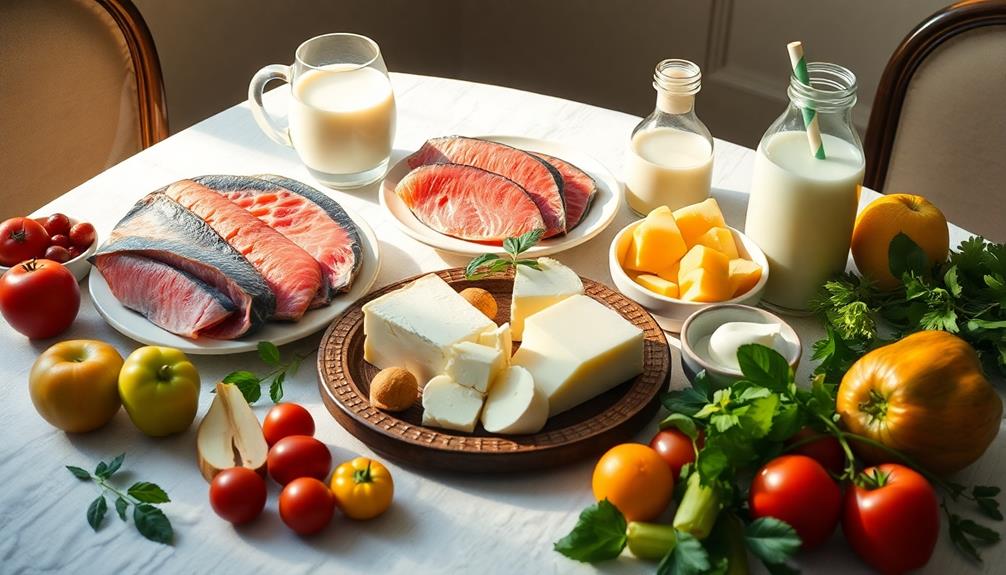Certain foods are considered taboo during pregnancy mainly due to cultural beliefs that link them to health risks, like miscarriage or developmental issues. For instance, many pregnant women avoid meats or specific fruits based on fears about adverse outcomes, often influenced by family and tradition. These misconceptions lead to restrictive diets, which can result in nutritional deficiencies. Instead of receiving essential nutrients, you might find yourself missing out due to these unverified fears. Understanding the nutritional benefits of these foods is vital, and there's much more to uncover about how to navigate these beliefs effectively.
Key Takeaways
- Cultural beliefs link certain foods to negative pregnancy outcomes, leading to dietary restrictions based on perceived risks.
- Misconceptions about foods, such as bananas causing larger fetal heads, contribute to harmful dietary choices during pregnancy.
- Social pressure from family, particularly mothers-in-law, reinforces adherence to food taboos despite lack of scientific evidence.
- Avoiding nutrient-rich foods can result in maternal malnutrition and adverse health outcomes for both mother and child.
- Understanding the nutritional value of foods can improve dietary practices and challenge harmful taboos during pregnancy.
Cultural Significance of Food Taboos

Food taboos during pregnancy hold deep cultural significance, influencing what expectant mothers eat. These dietary restrictions often stem from cultural beliefs that link specific foods to adverse health outcomes, like miscarriage or fetal malformations.
In rural communities, such as those in West Bengal, traditional beliefs dictate that pregnant women avoid certain fruits, vegetables, and meats, based on perceived effects on their health and that of their unborn child. For instance, in Ethiopia, cultural practices may lead to avoidance of foods like yogurt or legumes, as they're sometimes considered harmful during pregnancy, reflecting the importance of understanding Ethiopian dietary customs.
You might find that these taboos classify foods as "hot" or "cold," steering you away from "cold" foods to maintain balance and health. This classification can create social pressure, particularly from family members, like mothers-in-law, who reinforce these dietary practices.
Misconceptions about the health effects of certain foods contribute to the prevalence of these taboos. For example, studies show that in Ethiopia, some pregnant women avoid yogurt and legumes due to such beliefs.
These food taboos greatly affect the nutritional status of pregnant women, shaping their diets and potentially impacting their health outcomes. Understanding the cultural significance behind these restrictions can help you navigate your own dietary choices during pregnancy while respecting traditional practices.
Common Foods Considered Taboo

Many cultures impose specific dietary restrictions during pregnancy, leading to a variety of common foods considered taboo. In rural West Bengal, pregnant women often avoid bananas, papayas, brinjal (eggplant), meat, fish, and eggs, with beliefs linking these foods to miscarriage and fetal malformations.
Similarly, in Ethiopia, misconceptions about the effects of yogurt, legumes, honey, and various fruits drive pregnant women to steer clear of these foods, fearing delivery complications and impacts on fetal health. In fact, traditional Ethiopian dishes like kitfo are often avoided due to concerns over raw ingredients and their perceived risks during pregnancy.
Zulu women also frequently avoid certain fruits, butternut, eggs, and sweets, citing concerns over high blood pressure and complications like miscarriage and jaundice. A study in Bahir Dar city found that 22.5% of pregnant women avoid meat, while 21.4% skip eggs, influenced by beliefs about fetal head size and delivery complications.
The prevalence of these food taboos varies by region, with around 27.5% of pregnant women in Bahir Dar reporting such restrictions.
These cultural influences shape dietary intake during pregnancy, often leading to misconceptions that can impact nutritional requirements and maternal health. It's essential to understand these taboos and their origins to provide better support for pregnant women.
Reasons Behind Dietary Restrictions

Cultural beliefs considerably influence dietary restrictions during pregnancy, often linking certain foods to adverse outcomes. Food taboos during pregnancy, such as avoiding bananas and papaya, stem from misconceptions that they could cause miscarriage or fetal malformations. Many communities believe that abstaining from meat and dairy prevents complications during labor, despite a lack of scientific backing.
Similarly, some cultures might avoid certain ingredients, such as cassava or coconut, during pregnancy due to unfounded fears about their effects on fetal health, reflecting deeper regional culinary traditions.
You might find that specific food restrictions, like the avoidance of dark-colored fruits and vegetables, are rooted in the desire to prevent undesirable traits in newborns. Social pressure from family members, particularly mothers-in-law and elders, reinforces adherence to these food taboos, compelling you to conform to traditional practices.
This social dynamic can make it difficult for you to question these restrictions, even when they may not serve your best interests.
Moreover, a limited understanding of the nutritional value of various foods often leads to malnutrition during pregnancy. By adhering to these dietary restrictions without questioning their validity, you may unintentionally compromise your maternal nutrition.
Recognizing the influence of cultural beliefs and social pressures can help you make more informed choices for your health and that of your baby.
Impact on Maternal and Fetal Health

Adhering to food taboos during pregnancy can greatly impact both maternal and fetal health. When you avoid essential nutrient-rich foods due to cultural beliefs, you risk maternal malnutrition, which can lead to adverse outcomes like low birth weight and preterm delivery.
For instance, misconceptions surrounding certain foods, such as the myth that bananas may cause larger fetal head sizes, can result in significant dietary restrictions that harm fetal development. Additionally, avoiding protein sources like chicken, which is rich in essential nutrients, can deprive both mother and baby of crucial sustenance.
Understanding the benefits of foods like Mushroom Masala, which offers a rich blend of nutrients, can help in making informed dietary choices during pregnancy.
In many rural communities, traditional food taboos often take precedence over medical advice, leading you to forgo crucial sources of protein and calcium found in meat and dairy. This lack of essential nutrients during pregnancy can have lasting effects, potentially stunting growth and causing developmental delays in your children, thereby highlighting the intergenerational impact of inadequate nutrition.
Increasing your awareness of the nutritional value of previously taboo foods can enhance your dietary practices during pregnancy. By prioritizing maternal health and understanding the importance of balanced nutrition, you can improve outcomes for both yourself and your baby, ensuring a healthier start to life.
Addressing Misconceptions and Education

It's crucial to address the misconceptions surrounding food during pregnancy, as these beliefs can greatly impact your nutritional choices.
Cultural beliefs often lead to food taboos that lack scientific backing, resulting in harmful dietary restrictions. Many pregnant women rely on these misconceptions, which can negatively affect maternal health and fetal development.
For instance, understanding the nutritional benefits of seasonal ingredients can encourage healthier eating habits. Additionally, incorporating foods like nettles, known for their rich vitamin content, can enhance overall wellness during pregnancy.
To effectively combat these issues, consider the following strategies:
- Education on Nutritional Value: Understand the importance of foods often deemed taboo, like bananas and eggs, and their role in a balanced diet during pregnancy.
- Culturally Sensitive Health Communication: Engage with healthcare providers who respect cultural beliefs while providing accurate nutritional information. This helps bridge the gap between tradition and science.
- Targeted Interventions: Implement educational programs that involve family dynamics, particularly addressing the influence of mothers-in-law in rural communities. This can promote healthier dietary choices among pregnant women.
Frequently Asked Questions
Why Must Certain Foods Be Avoided During Pregnancy?
You must avoid certain foods during pregnancy to reduce risks of complications and guarantee your baby's health. Some foods could cause adverse reactions, while others might lead to nutritional deficiencies that affect both you and your baby.
Why Can't You Eat Certain Things When Pregnant?
You might hear you can't eat certain things during pregnancy due to beliefs about harm. However, many of these ideas lack scientific backing, so it is crucial to consult your doctor for accurate dietary guidance.
What Foods Are Prohibited During Pregnancy?
During pregnancy, you should avoid certain foods like raw fish, unpasteurized dairy, and undercooked meats. Additionally, steer clear of high-mercury fish and certain soft cheeses to guarantee your baby's health and safety.
What Are Examples of Food Taboos?
They say, "What you eat is what you are." In various cultures, you might avoid bananas, eggs, or dark-colored fruits, believing these could harm your baby or lead to complications during pregnancy.
Conclusion
In traversing the complex landscape of pregnancy, understanding food taboos is essential. Think of these restrictions as a protective shield, guarding both you and your baby from potential harm. By recognizing the cultural significance and health implications of certain foods, you empower yourself to make informed choices. With knowledge, you can transform fear into confidence, ensuring a nurturing environment for your little one. Embrace this journey, and remember that every bite reflects your love and commitment to their well-being.









